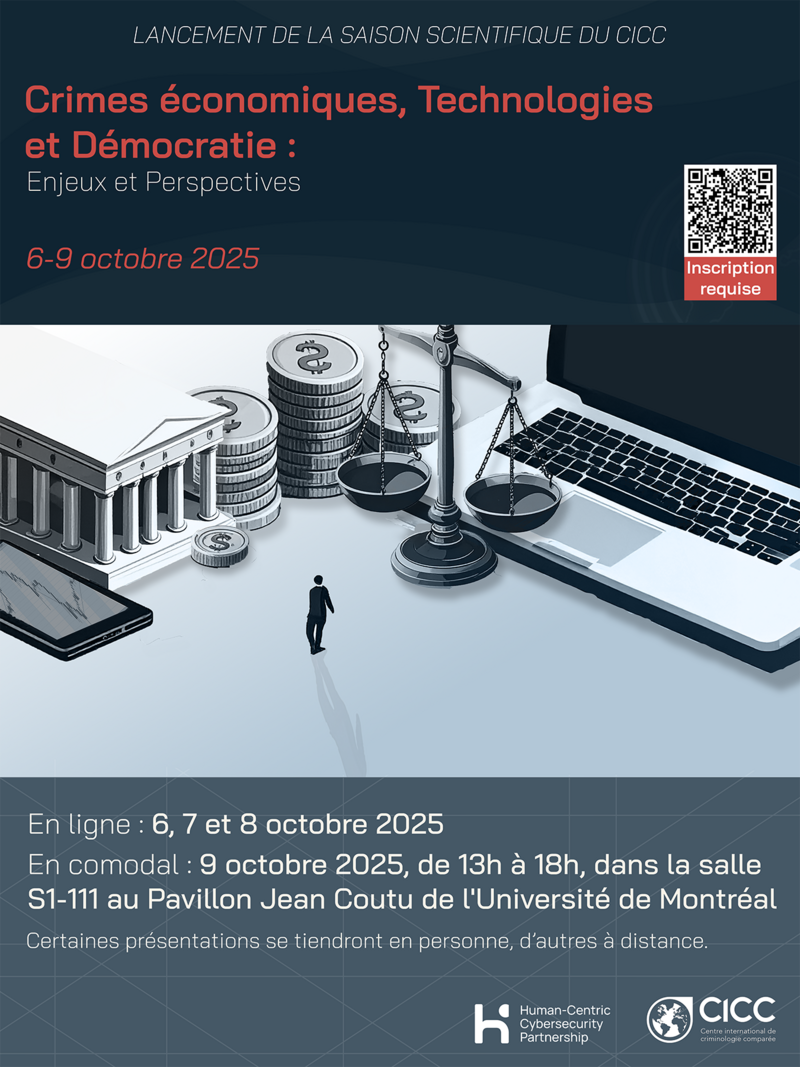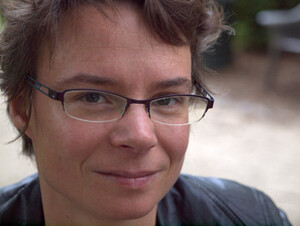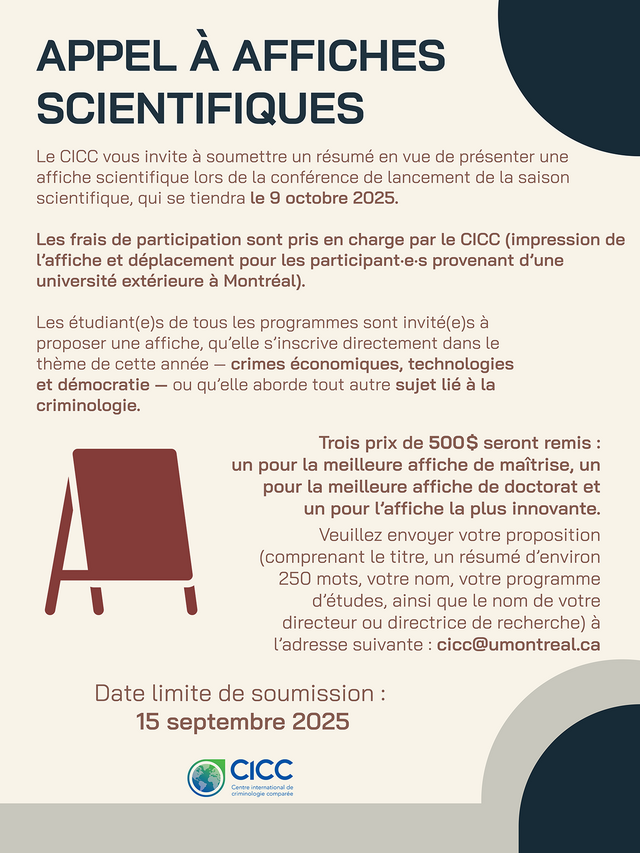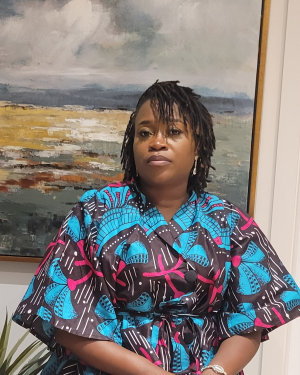
This event, organized as part of the launch of the CICC’s 2025–2026 scientific season, will be dedicated to the theme “Economic Crime, Technology, and Democracy: Challenges and Perspectives.”
At a time when technologies are reshaping our economies and modes of governance, economic crime is taking on new forms—more complex, more transnational, and more invisible. This week of conferences seeks to bring together diverse perspectives around three interrelated axes: the evolution of economic crime in the digital age, the uses (and misuses) of technologies, and the consequences for our democracies.
A hybrid session will be held at the Université de Montréal on October 9, featuring presentations, an award ceremony, and an in-person cocktail.
In addition, a scientific poster competition is being organized for students supervised by a CICC researcher. To register, click here to complete the form.
This free activity offers students an opportunity to present their research and engage in exchanges with scholars and practitioners from the field.
|
Date/Time |
Presentation |
|
Monday, October 6, 11:45 AM – 12:45 PM (Zoom) |
The Mediatization of Elite Delinquency: A Driver for Increased Repression? – Guest of Honor Speaker, Professor Carla Nagels |
|
Tuesday, October 7, 3:20 PM – 4:50 PM (Zoom) |
Panel: Preventing, Disrupting, and Mitigating Online Harms – Perspectives from the Trenches (RCMP, Public Safety Canada, ISED, and Flare) |
|
Wednesday, October 8, 11:45 AM – 12:45 PM (Zoom) |
Geographic Risks in Financial Crime: Research and Analytical Tools – Lucas Millán |
|
Thursday, October 9, 12:30 PM – 6:00 PM (In person and via Zoom) |
Multiple speakers |
|
1 :00 PM – 1 :20 PM |
Memecoin fraud via Telegram: a criminological big data approach – Keynote Speaker, Jack Cunliffe |
|
1:20 PM – 2:00 PM |
Tax Evasion in Québec: What Can Be Learned from Surveys? – Assistant Professor Antoine Genest-Grégoire |
|
2:00 PM – 2:45 PM |
Public-Private Partnerships and the Governance of Digital Disinformation – Professor Michèle Patricia Akiobe Songolo |
|
3:15 PM – 4:00 PM |
Political Content Supply on TikTok: An Oligopoly of Attention – Assistant Professor Benjamin Guinaudeau |
|
4:00 PM – 4:45 PM |
Discussion: Detection, Prevention, and Regulation of Economic Crime in the Age of New Technologies, and Their Effects on Trust in Institutions – Multiple panelists |
Please scroll down for additional information about the conferences.

Guest of Honor Speaker
Carla Nagels, Professor of Criminology, Université libre de Bruxelles
For several years, Carla Nagels has focused her research on deviance committed by elites in their professional settings. Seeking to make the professional deviance of elites more accessible to the Francophone scientific community and to spark renewed interest in a neglected subject, she co-authored with Pierre Lascoumes of Sciences Po Paris a book on the Sociology of Delinquent Elites in the U Collection at Armand Colin in 2014, which was republished in an updated edition in 2018. She has also co-edited two special issues on this theme: one in Criminologie (2016, vol. 49) with Daniel Dos Santos, entitled When Economic Crime Contributes to the Development of the Social Sciences; and another in Champ pénal (2018, vol. XV) with Anthony Amicelle, entitled The Arbiters of Illegality: New Perspectives on Social Control Practices. She is currently exploring the deviance of scientists, who are at once colleagues and white-collar offenders.
Abstract: Despite growing media visibility over the past fifteen years, the transgressive practices of elites largely continue to escape criminal condemnation. Understanding, on the one hand, how the media portray this phenomenon and, on the other, how the criminal justice system addresses it helps shed light on a gap that appears counterintuitive at first sight. Yet, one might wonder whether this disconnect contributes to the broader crisis of trust in institutions and political leaders. Between the “bad apples” and the “they’re all corrupt” narratives, popular resentment is intensifying.


Lucas Millán, Tax Justice Network
Lucas Millán is a senior researcher at the Tax Justice Network (TJN), focusing on comparative analysis and advocacy in the areas of financial secrecy and international taxation. A lawyer admitted to the New York Bar, he has developed extensive expertise in the global financial and tax architecture over eight years of comparative research. A major contributor to the Financial Secrecy Index (FSI) and the Corporate Tax Haven Index (CTHI), he recently developed the Global Tax Expenditure Transparency Index (GTETI) for the Council on Economic Policies, where he is also a fellow. Educated in France and the United States, he holds degrees from Université Pierre-et-Marie-Curie and Université Panthéon-Assas, as well as master’s degrees from Université Paris-Sorbonne and Boston University. His academic journey spans mathematics, law, international relations, and tax policy.
Abstract: This presentation will explore the logic of geographic risks, outlining the structural risks inherent in cross-border economic activities and examining key processes in AML/CFT due diligence, suspicious transaction reporting/analysis, and tax monitoring. It will then focus on the Financial Secrecy Index (FSI)—with an emphasis on beneficial ownership transparency and cross-border cooperation—and the Corporate Tax Haven Index (CTHI), which assesses effective taxation, constructive equivalents, and anti-abuse regulations. Finally, the presentation will highlight how geographic risk data from TJN is applied in administrative cooperation (MoUs and support for audit targeting), macroeconomic assessments of illicit financial flows, academic research (including event studies), and policy advocacy.
In addition, a scientific poster competition is being organized for students supervised by a CICC researcher, click here to complete the form.
This free activity offers students the opportunity to present their research and exchange with scholars and practitioners.

12:30 – 1:00 PM | WELCOME – SCIENTIFIC POSTERS
(Room S1-111, Pavillon Jean Coutu, Université de Montréal)
1:00 PM | OPENING REMARKS (Hybrid)
(Room S1-111, Pavillon Jean Coutu, Université de Montréal)
1:00 PM - 1:20 PM | Keynote (Hybrid: in person and online) (Location: Université de Montréal, Room S1-111, Pavillon Jean Coutu)

Jack Cunliffe (keynote), Senior Lecturer in Quantitative Methods and Criminology, Director of Studies for Criminology, University of Kent
1:20 – 2:00 PM | LECTURE (Hybrid: in person and online) (Location: Université de Montréal, Room S1-111, Pavillon Jean Coutu)

Antoine Genest-Grégoire, Université de Sherbrooke, Research Chair in Taxation and Public Finance
Antoine Genest-Grégoire is an Assistant Professor in the Department of Taxation at the Université de Sherbrooke, a researcher with the Research Chair in Taxation and Public Finance, and a fellow at Social Capital Partners. His work focuses on the distributive effects of tax policy and how these are perceived by citizens. He holds a PhD from Carleton University, and his research has been supported by federal and Québec funding agencies. His work has been published in the National Tax Journal, the Canadian Tax Journal, and Canadian Public Policy.
Abstract: Tax evasion is a particularly difficult phenomenon to study, as it is an illegal, stigmatized, and therefore concealed practice. While its scope can be indirectly observed through macroeconomic measures, understanding its determinants requires individual-level data. This presentation draws on two surveys conducted in Québec that measure individuals’ tax evasion behaviors. It explores the frequency of different forms of evasion, the degree of stigmatization surrounding these practices, and the factors associated with higher or lower levels of tax evasion among individuals.
2:00 – 2:45 PM | LECTURE (Hybrid: in person and online) (Location: Université de Montréal, Room S1-111, Pavillon Jean Coutu)

Michèle Patricia Akiobe Songolo, Professor of Economic Crime, Université Laval
Michèle Patricia Akiobe Songolo is a professor of criminology at the School of Social Work and Criminology at Université Laval. Her research primarily focuses on contemporary issues related to combating economic and financial crime. She also has extensive experience in financial market regulation, acquired within both national and international regulatory bodies. Notably, she served as a member of the Financial Crime Task Force of the International Association of Insurance Supervisors (IAIS) and currently sits on the Legal Committee of Transparency International Canada.
Abstract: Digital disinformation, particularly through deepfakes or hyper-realistic manipulations, presents growing challenges for contemporary democracies. Used for fraudulent, economic, or political purposes, it undermines social trust, fuels cybercrime, and weakens the legitimacy of institutions (Rannou et al., 2020). Legal or purely technological responses alone have proven insufficient in the face of the scale and speed of these phenomena.
This presentation proposes to explore public–private partnerships as an innovative governance tool to create an adequate regulatory environment and ensure better protection for citizens. Inspired by the European co-regulation model (Kachelmann & Reiners, 2023), this partnership brings together the state—as guarantor of democratic legitimacy and the legal framework—and digital platforms, as holders of technologies and data, while also integrating civil society as a watchdog and counter-power. A comparison with the Canadian approach will also be conducted to identify areas of convergence, divergence, and limitation.
2:45 – 3:15 PM | COFFEE BREAK – SCIENTIFIC POSTERS (Location: Université de Montréal, Room S1-111, Pavillon Jean Coutu)
3:15 – 4:00 PM | LECTURE (Hybrid: in person and online) (Location: Université de Montréal, Room S1-111, Pavillon Jean Coutu)

Benjamin Guinaudeau, Assistant Professor, Université Laval
Co-authors: Sol Messing (New York University), Kylan Rutherford (New York University), Joshua Tucker (New York University)
Benjamin Guinaudeau is Assistant Professor in Computational Social Science at Université Laval (Québec, Canada). His work lies at the intersection of comparative politics, political communication, and data science, examining how emerging technologies (social media, AI) reshape democratic representation. Before joining Université Laval, he completed his PhD in Political Science at the University of Konstanz (Germany), conducted research with Meta Core Data Science (London, UK), and was a postdoctoral researcher at the Center for Social Media and Politics (CSMaP) at NYU (New York, USA).
Abstract: Powered by an opaque recommendation system that generates a personalized and endless feed for each of its 1.5 billion users, TikTok has rapidly become a major social media platform. Unsurprisingly, it has also emerged as a central arena for public debate and the circulation of political information. Yet, TikTok’s aggressive data-retention policy has hindered systematic descriptions of the scope and nature of political content on the platform. Little is known about what political content is produced, by whom, and how it is distributed. Drawing on a unique random sample covering most videos uploaded in the United States between October 2024 and March 2025, this study seeks to fill this gap by describing these three dimensions. In doing so, it contributes to ongoing debates about TikTok’s potentially harmful consequences for democracy.
Our analyses reveal that political content accounts for only a small fraction of overall supply (0.5%) but attracts disproportionate attention: around 3% of views during regular periods and up to 10% on the day of the November 2024 presidential election. Attention is highly concentrated: the top 1% of political accounts secure 83% of views, an inequality even more extreme than wealth distribution in the United States. The resulting “infotainment elite” largely operates independently from traditional media and political organizations, mastering content optimization for algorithmic distribution and generating short-lived peaks of attention in response to current events. This rapid cycle undermines democratic quality in two ways: it leaves little room for sustained public deliberation and weakens the slow processes of sanction and accountability that ensure citizen oversight of political leaders. Moreover, the lack of ethical standards governing these actors fosters the spread of disinformation, further degrading the political information ecosystem on TikTok. Contrary to some commentators’ expectations, however, the study finds no evidence of a durable ideological bias: conservative and progressive content follow distinct, non-synchronized attention cycles, with no single “camp” consistently dominating.
4:00 – 4:45 PM | PRACTICE-ORIENTED PANEL (Hybrid: in person and online) (Location: Université de Montréal, Room S1-111, Pavillon Jean Coutu)
Discussion: Detecting, Preventing, and Regulating Economic Crimes in the Era of New Technologies, and Their Effects on Institutional Trust
Jessica Lelièvre (Class Action Law Firm – Trudel Johnston & Lespérance)
Pierre-Yves Lespérance / Marie-Isabelle Dionne (Autorité des Marchés Financiers)
Pierre-Marc Bureau, Google
Ian St-Cyr, Bell
4:45 – 5:00 PM | CLOSING REMARKS – SCIENTIFIC POSTER AWARD CEREMONY (Hybrid: in person and online) (Location: Université de Montréal, Room S1-111, Pavillon Jean Coutu)
5:00 – 7:00 PM | COCKTAIL RECEPTION (In person only) (Location: Université de Montréal, Room S1-111, Pavillon Jean Coutu)
Attention - Votre version d'Internet Explorer est vieille de 21 ans et peut ne pas vous offrir une expérience optimale sur le site du CICC. Veuillez mettre à jour votre ordinateur pour une expérience optimale. Nous vous recommandons Firefox ou Chrome, ou encore ChromeFrame si vous êtes dans un environnement corporatif ou académique dans lequel vous ne pouvez pas mettre à jour Internet Explorer.